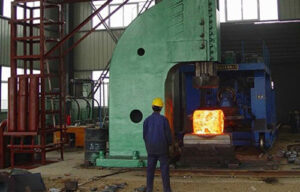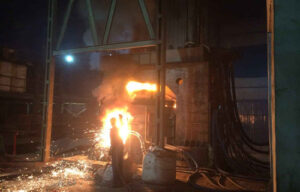Hot work tool steel is an essential material in the extrusion industry, where precision and durability are paramount. Extrusion, a manufacturing process that shapes materials by forcing them through a die, involves high temperatures and pressures. To meet the demanding requirements of extrusion applications, selecting the right hot work tool steel and considering various key factors is crucial. In this comprehensive article, we will explore the critical considerations when using hot work tool steel in extrusion, including material properties, alloy selection, heat treatment, and more.

1. Introduction
Extrusion is a versatile manufacturing process used in various industries, from aerospace to food production. The reliability and longevity of extrusion tooling depend significantly on the choice of hot work tool steel and its properties.
2. The Extrusion Process
Overview of Extrusion
Extrusion involves forcing a material, often in a heated state, through a die to create a specific shape or profile. This process requires precision and consistency.
The Role of Tooling in Extrusion
Tooling, including dies and mandrels, plays a critical role in the extrusion process. These components must endure high temperatures, pressure, and abrasion while maintaining dimensional accuracy.
3. Material Properties for Extrusion
Heat Resistance
Hot work tool steel‘s heat resistance is crucial for withstanding the elevated temperatures encountered during extrusion without losing structural integrity.
Wear Resistance
Wear resistance is essential to prevent premature wear of dies and mandrels, ensuring that they maintain their precision and longevity.
Toughness
Toughness is necessary to withstand mechanical stresses and impact loads during the extrusion process, preventing tool failure.
Machinability
The machinability of hot work tool steel affects the ease with which dies and mandrels can be fabricated and maintained.
4. Selecting the Right Hot Work Tool Steel
Alloy Options
Various hot work tool steel alloys are available, each with unique properties. The selection should consider the specific extrusion material and process requirements.
Matching Alloys to Extrusion Materials
Different materials, such as aluminum, plastics, and food products, require specific hot work tool steel alloys to ensure optimal performance and product quality.

5. Heat Treatment for Extrusion Tooling
Annealing and Stress Relieving
Annealing and stress-relieving processes help relieve internal stresses and maintain the desired hardness and toughness.
Hardening and Tempering
Hardening and tempering processes are critical to achieving the appropriate hardness and heat resistance for extrusion tooling.
Surface Treatment
Surface treatments, such as nitriding or coatings, can enhance wear resistance and extend the life of extrusion tooling.
6. Extrusion Applications and Industries
Aluminum Extrusion
Aluminum extrusion is a common application in industries like construction, automotive, and aerospace. Proper tooling materials are crucial for achieving precision and efficiency.
Plastic Extrusion
Plastic extrusion involves a wide range of materials and profiles. Tooling materials must match the specific plastic characteristics to avoid defects and ensure product quality.
Food Extrusion
Food extrusion is used in the production of various food products. Hygiene and material compatibility are vital considerations for tooling in this industry.
Extrusion in Aerospace
Aerospace applications often require specialized extrusions for components. Tooling materials must meet stringent quality and performance standards.
7. Challenges and Considerations
Balancing Properties
Balancing the various properties of hot work tool steel, including heat resistance, wear resistance, toughness, and machinability, is a critical challenge in extrusion tooling.
Preventing Die Defects
Proper maintenance, inspection, and defect prevention strategies are essential for ensuring the quality and consistency of extruded products.
Maintenance and Inspection
Regular maintenance and inspection of extrusion tooling are necessary to identify wear, damage, or defects and prevent costly production interruptions.
8. FAQs
Frequently Asked Questions About Hot Work Tool Steel in Extrusion
Q1. Can hot work tool steel be used for both hot and cold extrusion processes?
Hot work tool steel is primarily designed for hot extrusion processes due to its excellent heat resistance. For cold extrusion, specialized tool steels or die materials may be more appropriate.
Q2. What are the most common defects in extrusion dies, and how can they be prevented?
Common defects include die lines, surface cracking, and profile distortion. Proper die design, maintenance, and material selection can help prevent these defects.
Q3. Is there a specific hot work tool steel grade recommended for food extrusion applications?
Tool steels used in food extrusion must meet specific hygiene and material compatibility standards. Consultation with material experts and compliance with relevant regulations are crucial when selecting the appropriate grade.

